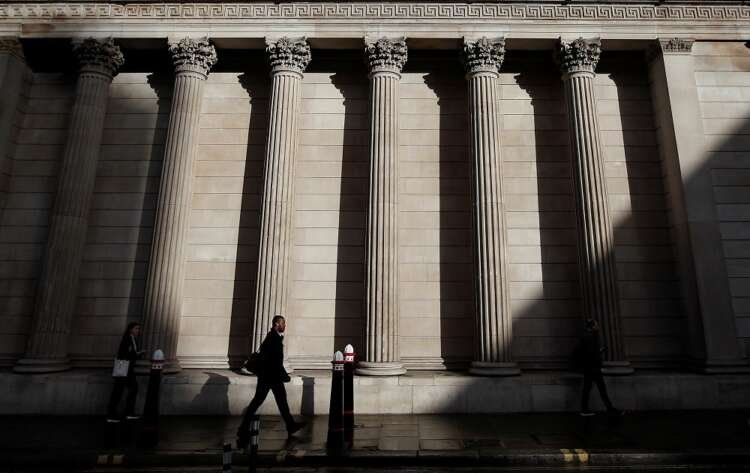Bank of England to buy 65 billion pounds of UK bonds to stem rout
Published by Jessica Weisman-Pitts
Posted on September 28, 2022
4 min readLast updated: February 4, 2026

Published by Jessica Weisman-Pitts
Posted on September 28, 2022
4 min readLast updated: February 4, 2026

By David Milliken
LONDON (Reuters) -The Bank of England stepped into Britain’s bond market on Wednesday to stem a market rout, pledging to buy 65 billion pounds ($69.4 billion) of long-dated gilts after a government fiscal statement triggered the biggest sell-off in decades.
Citing potential risks to UK financial stability, the BoE also said it would delay the start of a programme to sell down its 838 billion pounds ($891 billion) of government bond holdings, which had been due to begin next week.
“Were dysfunction in this market to continue or worsen, there would be a material risk to UK financial stability,” the BoE said. “This would lead to an unwarranted tightening of financing conditions and a reduction of the flow of credit to the real economy.”
The BoE said it remained committed to an 80 billion-pound reduction over the next 12 months in its holdings of bonds bought under its quantitative easing programme after the global financial crisis of 2007-08 and during the COVID-19 pandemic.
British 30-year bond yields hit their highest since 2002 on Wednesday, before the BoE announcement, and traders complained it was becoming increasingly hard to buy and sell bonds as no one wanted the risk of holding such a volatile asset.
Pension schemes had been selling gilts to meet emergency collateral calls or reduce exposure, pensions advisers said.
“There are schemes running out of cash at the moment,” one pensions consultant said before the BoE intervention.
After the BoE announcement, long-dated gilt yields plunged – representing a surge in prices – with 30-year yields dropping more than a full-percentage point, their biggest one-day drop in Refinitiv records dating back to 1992.
The central bank put no limit on the size of its intervention but said it initially planned to hold daily auctions to buy up to 5 billion pounds of gilts with a maturity of at least 20 years, between Wednesday and Oct. 14.
“The purpose of these purchases will be to restore orderly market conditions,” it said.
TEMPORARY INTERVENTION?
The BoE last intervened in the gilt market to stem market turmoil in March 2020, when the pandemic roiled markets, expanding its then-dormant quantitative easing programme by hundreds of billions of pounds.
In contrast to then, the BoE said on Wednesday that the intervention would be strictly temporary and would be “unwound in a smooth and orderly fashion once risks to market functioning are judged to have subsided”.
Markets have baulked at the unfunded tax cuts that formed part of new finance minister Kwasi Kwarteng’s first fiscal statement on Friday.
“(The BoE) have put something of a floor under the market in the short term. However, the pro-cyclical fiscal policy remains and as such the respite may not be long lasting,” said Charles Diebel, head of fixed-income strategy at Mediolanum Asset Management.
The BoE’s intervention reduced long-dated bond yields back to their level at the end of Friday – after the initial negative reaction to Kwarteng’s statement – but shorter-dated yields were still higher.
Speaking on Tuesday, BoE chief economist Huw Pill said the BoE would only delay its planned sale of bonds – worth 8.7 billion pounds over the final quarter of the year – if it saw market dysfunction, and it would not stop an orderly market repricing of the debt.
Economists and investors said the central bank would be keen to avoid the perception that it was stepping in to finance the government, or that the market turmoil jeopardised its ability to take steps to return inflation to its 2% target.
“The likelihood of the market misunderstanding this policy change though is high and risks a potential hazardous misstep,” said Bethany Payne, global bond portfolio manager at Janus Henderson Investors.
($1 = 0.9361 pounds)
(Reporting by David Milliken, additional reporting by Carolyn Cohn, Sachin Ravikumar and Dhara Ranasinghe; Editing by Catherine Evans, William Schomberg and Toby Chopra)
The Bank of England is the central bank of the United Kingdom, responsible for issuing currency, maintaining monetary stability, and overseeing the financial system.
Financial stability refers to a condition where the financial system operates effectively, with institutions able to manage risks and absorb shocks without major disruptions.
Bond yields represent the return an investor can expect to earn from holding a bond, typically expressed as an annual percentage of the bond's face value.
Explore more articles in the Top Stories category











